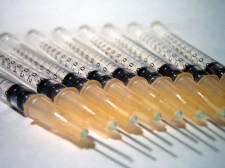 Blood hormone level tests can potentially predict a woman s risk for developing postmenopausal breast cancer for up to 20 years, according to data from Nurses Health study to be presented at the 11th annual meeting of the American Association for Cancer Research.
Blood hormone level tests can potentially predict a woman s risk for developing postmenopausal breast cancer for up to 20 years, according to data from Nurses Health study to be presented at the 11th annual meeting of the American Association for Cancer Research. Blood hormone level tests can potentially predict a woman s risk for developing postmenopausal breast cancer for up to 20 years, according to data from Nurses Health study to be presented at the 11th annual meeting of the American Association for Cancer Research.
Blood hormone level tests can potentially predict a woman s risk for developing postmenopausal breast cancer for up to 20 years, according to data from Nurses Health study to be presented at the 11th annual meeting of the American Association for Cancer Research.
Dr. Xuehong Zhang of Harvard Medical School and colleagues analyzed data from 796 patients with postmenopausal breast cancer who had not received hormone therapy. Blood hormone levels were measured at two time points: between 1989 and 1990 and between 2000 and 2002. Each patient was also matched with two controls who were not diagnosed with breast cancer.
The hormones measured in the study included estradiol, testosterone and dehydroepiandrostenedione sulfate (DHEAS). Zhang and colleagues found that women with hormone levels in the highest 25 percent for estradiol, testosterone and DHEAS had a one-and-a-half to two-fold greater risk of developing breast cancer compared with women in the lowest 25 percent.
Furthermore, researchers also investigated the type of breast cancer that was associated with higher hormone levels. They found that increased hormone levels (except for DHEAS) tracked closely with increased risk for hormone receptor-positive breast cancer the most common type.
These data are quite convincing, albeit early, as possible new markers for increased breast cancer risk, says ACSH s Dr. Josh Bloom. This study suggests that measuring levels of certain hormones may be a valuable new means of identifying women who are at high-risk for breast cancer long before it occurs. They could then benefit from enhanced screening and possibly chemoprevention with drugs such as tamoxifen and raloxifene that have been shown to reduce the risk in higher-risk women.
ACSH s Dr. Gilbert Ross, while impressed with the numbers, was quick to say that hormone levels should not yet be deemed true risk factors. The results of this study are impressive, I agree. But this definitely needs to be replicated. We need to see where particular women fit within a range of hormone levels, including one that was found to have the opposite effect, that is, offered some lowering of risk. We need more data before we begin putting younger women on drugs.


